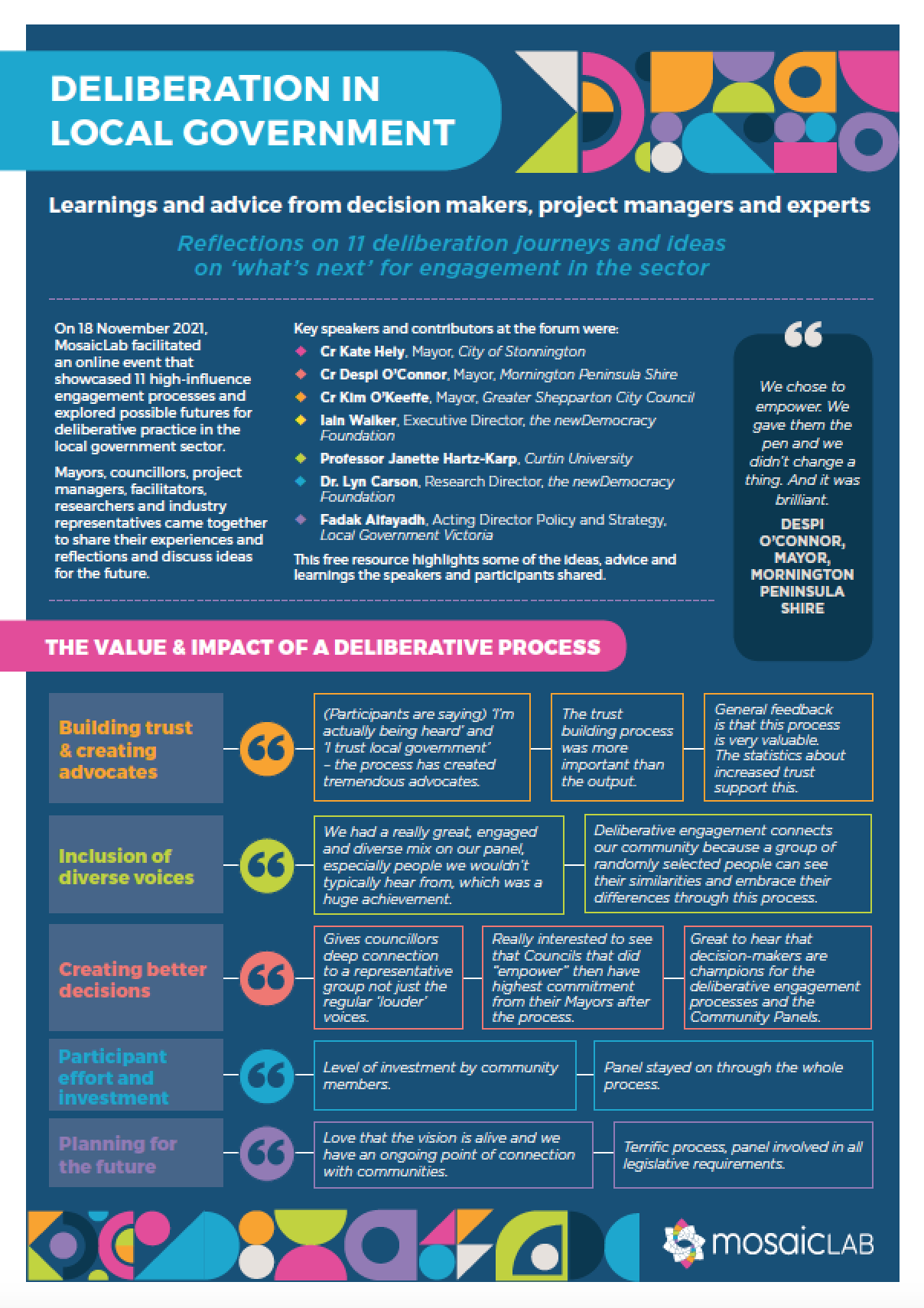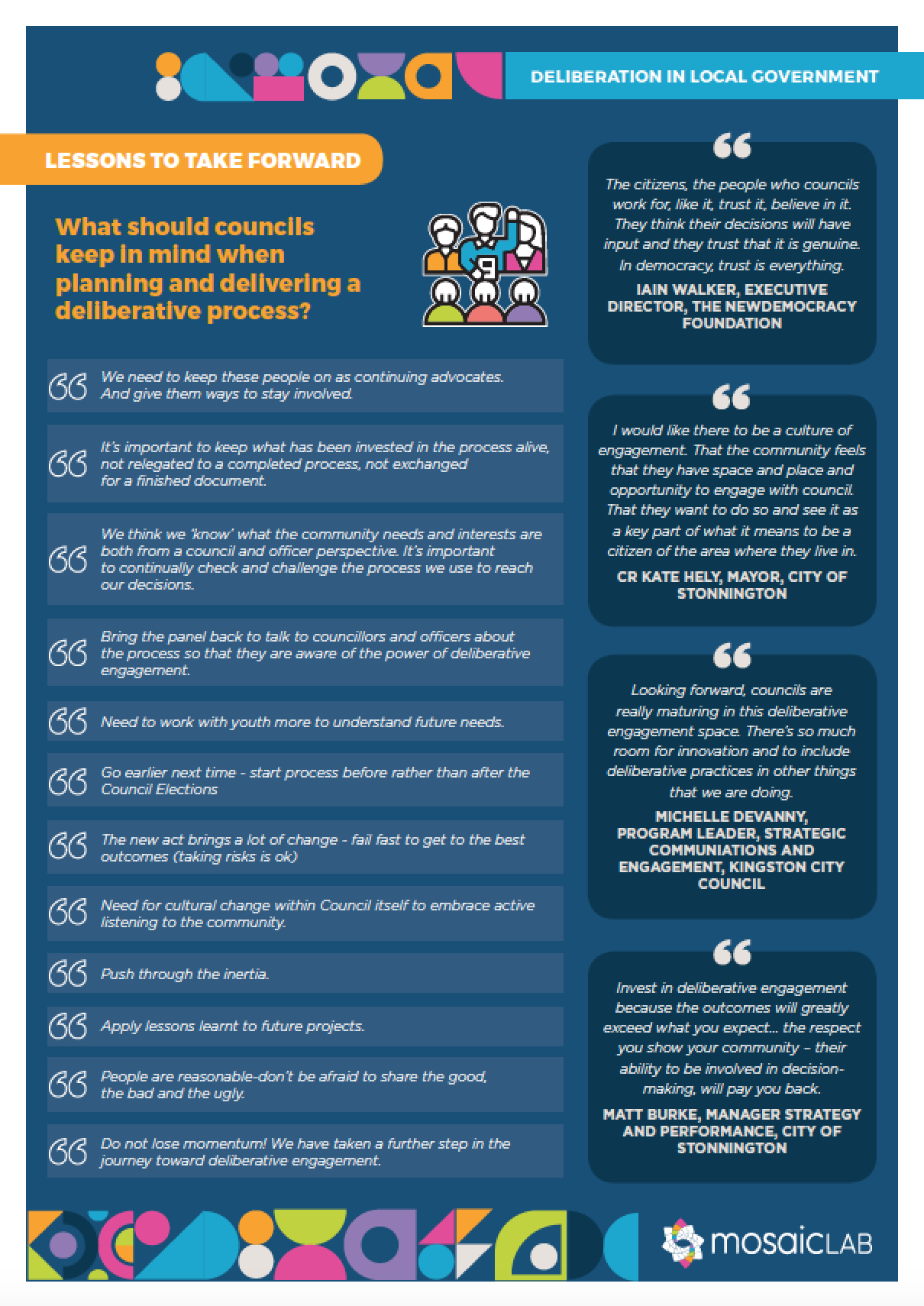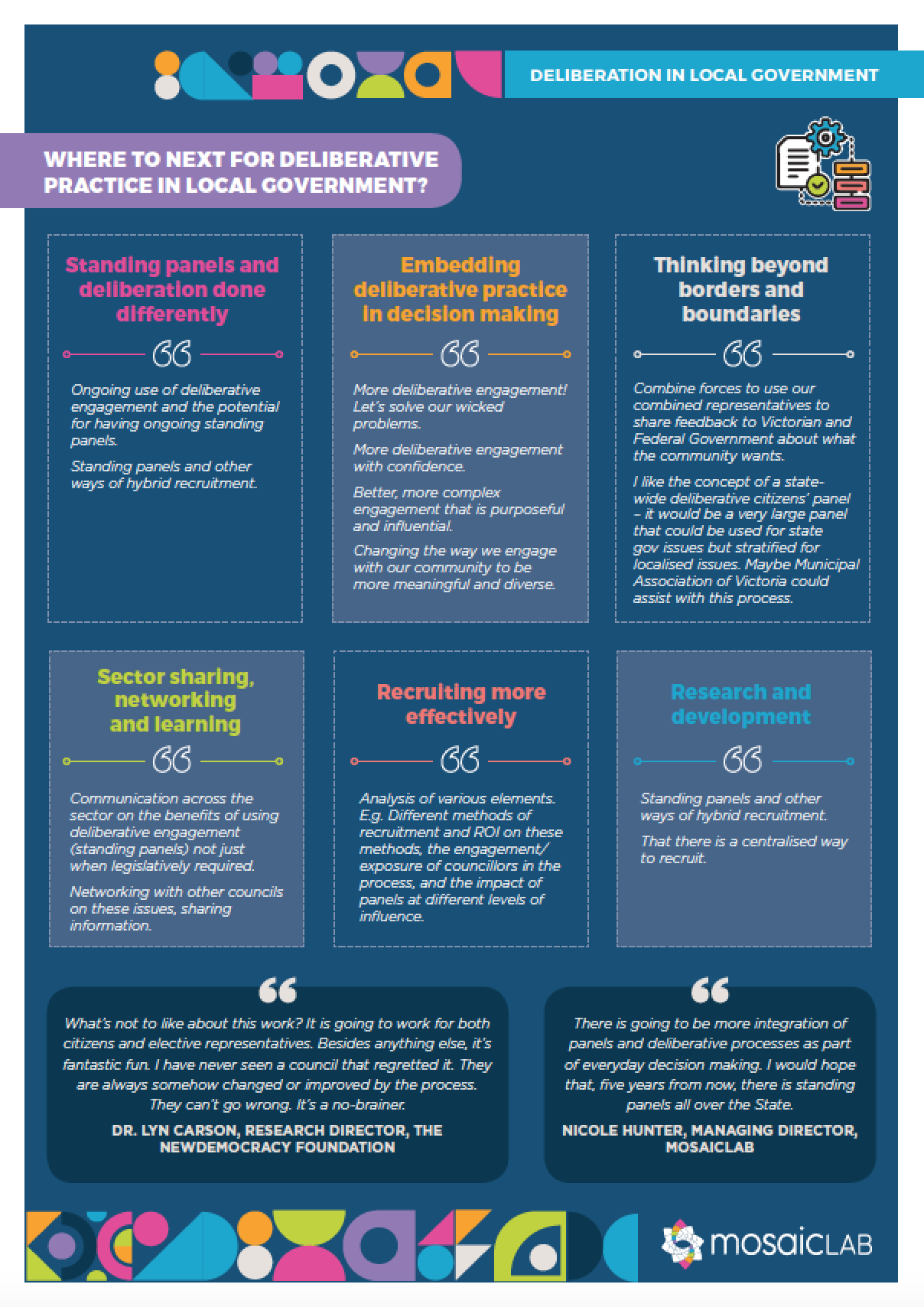Learnings from 11 projects and game-changing ideas for the future of deliberative engagement have been shared by Local Government leaders and engagement experts.
“The thing that really stood out today was the success of deliberative engagement. There are some challenges there, but there is also a sense of success and a wish for it to continue to happen.” ”
Mayor
Greater Shepparton City Council
Mayors, councillors, facilitators and industry representatives came together in November to celebrate and reflect on two years of learning. MosaicLab hosted the online event and facilitated a discussion about achievements, lessons learned and where deliberation is headed in 2022 and beyond.
The conversation signalled a new dawn for deliberative engagement. Ideas for the future included embedding deliberation in decision making, expanding engagement practice beyond borders through a collaborative, state-wide effort and the use of ‘standing panels’*.
Keen to lift your understanding or practice? We’ve captured the rich, insider insights from the council discussion as a free resource that offers great guidance for any organisation seeking to build deliberation into decision-making.
*Free resource coming soon, breaking down what standing panels are all about and when, why and how to invest in them. Stay tuned!
Download the free resources
Deliberation in Local Government: Reflections on 11 deliberation journeys and ideas on ‘what’s next’ for engagement in the sector.
Deliberation questions answered: Responses from MosaicLab and speakers at the event to key questions from councils.
THE STORY OF 11 TRANSFORMATIVE COUNCIL DELIBERATIONS
“There’s a whole lot of councils who are just ticking a box, not because they’re trying to avoid it, but because they don’t know how to do this (deliberative democracy). So we need to find ways of educating those councils and promoting the work that is currently being done to lift the game across the board.”
Research Director
the newDemocracy Foundation
Over the past two years, MosaicLab supported 10 Victorian councils to meet the new community engagement requirements of the Local Government Act 2020.
MosaicLab designed and facilitated deliberative processes that built community-owned Community Visions and Council Plans. Collectively, these councils service 21% of the Victorian population.
Each project involved a panel of randomly selected, descriptively representative, everyday people coming together to talk about complex community issues.
Not only did the work shape the future of each community, it also offered a learning experience for local government staff and elected officials. For some councils, this was the first time they had invested in a deliberative process.
Read the case study: 11 Transformative Council Deliberations.
Watch the video: 11 Deliberative Journeys - Participants’ Perspectives
DELIBERATION CELEBRATION: DISCUSSION HIGHLIGHTS
Guests at the November event heard from key speakers including three mayors, two researchers and representatives of Local Government Victoria and the newDemocracy Foundation.
The discussion revealed that these high-influence processes changed the organisations that ran them. Reflections included that:
“It feels like a movement has started and there is change in the wind and I am excited for the possibilities.
I think we are going to see a big culture change evolve inside organisations.”
Director and Facilitator
MosaicLab
councillors were connected to a representative group of diverse voices
decision makers became champions for the process and plans
participants have become community advocates for their councils
surveys undertaken revealed an impressive increase in participant trust in councils
the processes created an ongoing point of connection to their communities.
Advice was shared on areas such as project timing, steps to take after deliberation and the requirement to bravely share information with participants.
The conversation also opened up new thinking, ideas and pathways for deliberation into 2022 and beyond. This included thinking around how deliberation can be embedded into future planning a sustainable way.
Deliberation in Local Government: Reflections on 11 deliberation journeys and ideas on ‘what’s next’ for engagement in the sector.
Deliberation questions answered: Responses from MosaicLab and speakers at the event to key questions from councils.
“What I heard was that a lot of councils had similar challenges, but also had similar unexpected opportunities coming out of the process.”
Manager Strategy and Performance
City of Stonnington
“Deliberative engagement gives us an opportunity to get to know each other a lot better and have more community impact and input into where councils go into the future.”
Former Mayor
Mornington Peninsula Shire
WHERE TO NEXT?
Ok, so we have a solid foundation made from the positive impact of deliberative engagement processes to increase trust in democratic institutions, build supported decisions, encourage involvement in civic affairs and offer everyday people real influence over the issues that affect them.
But where do we go from here? Council decision makers and leaders raised lots of great questions at the event including:
“The citizens, the people who councils work for, like it, trust it, believe in it. They think their decisions will have input and they trust that it is genuine. In democracy, trust is everything.
”
Executive Director
the newDemocracy Foundation
how ‘standing panels’ might work to address challenges around running multiple processes
how to keep panels connected to the council
the timing of engagement around elections
translating visions into deliverables
how to scale appropriately to turn it into a business-as-usual practice
how to craft a broader culture of engagement
how to make councillors feel more comfortable and connected with people panels.
MosaicLab created a Q&A document responding to these questions and others raised on the day (see below).
Two WAYS TO LIFT YOUR DELIBERATIVE PRACTICE
1. Download the free resources
Deliberation in Local Government: Reflections on 11 deliberation journeys and ideas on ‘what’s next’ for engagement in the sector.
Deliberation questions answered: Responses from MosaicLab and speakers at the event to key questions from councils.
2. Take an online short course in 2022
The University of Technology Sydney and the newDemocracy Foundation have jointly developed online short courses designed to give decision-makers an understanding of the practical applications for deliberative citizen processes. The course covers when and why these processes work best – and give a grounding in the principles to look for to determine a quality project.
Small cohorts of 20-25 students have sessions with local and international speakers who have operated notable projects. Speakers include elected representatives, global standard setters including the OECD and government staff which makes for a highly practical experience. Past speakers include Jay Weatherill (former SA Premier), Jonathan O’Dea (Speaker, NSW Parliament) and Claudia Chwalisz (OECD Participation lead).
The cost is $650 and the next course is scheduled for April 2022. Register your interest here
NEED BACKGROUND? FURTHER READING AND RESOURCES
For more information on deliberative engagement, check out our free guide to deliberative democracy and our Short Guide to Deliberation for Victorian
*Coming soon: we’ll be sharing a free resource breaking down what standing panels are all about and when, why and how to invest in them. Stay tuned!
ENJOYED THIS POST?
Stay in the know! Get new posts, actionable ideas and fabulous free resources delivered to your inbox - subscribe to our monthly e-newsletter 'the Discussion'.




